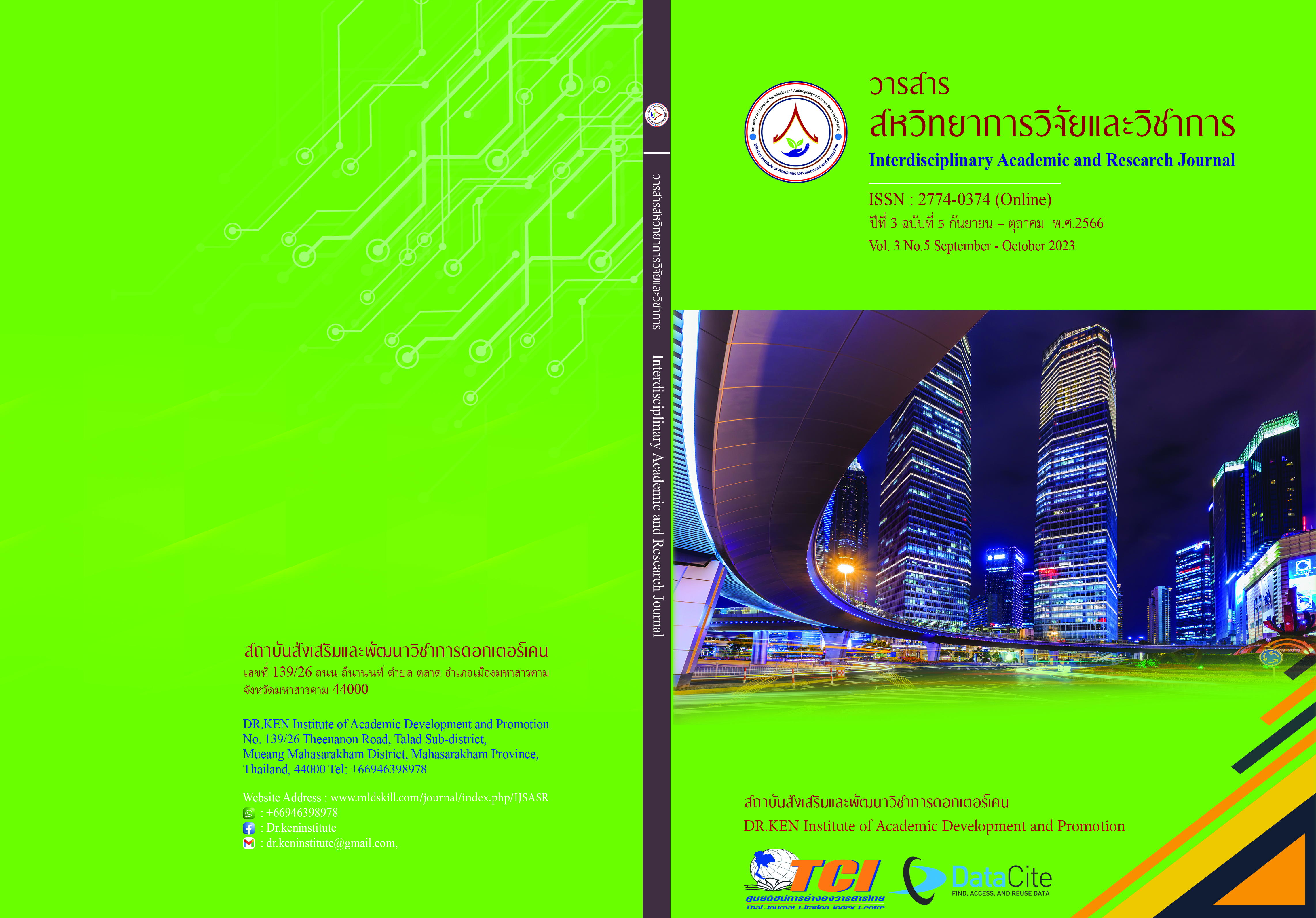Problem-Based Learning Management to Promote Collaborative Problem-Solving Competency and Learning Achievement on Electricity of Grade 9 Students
DOI:
https://doi.org/10.14456/iarj.2023.270Keywords:
Problem-Based Learning Activities; , Collaborative Problem-Solving Competency; , Stock Exchange of ThailandAbstract
Science plays an important role in present and future world society because science is the explanation of knowledge in nature and helps develop rational thinking, analytical thinking, and systematic problem-solving. Science learning therefore aims for students to learn science that emphasizes linking knowledge with processes and have important skills in researching and creating knowledge using various processes of inquiry and problem solving. The purposes of this research were to compare the learning achievement after receiving the problem-based learning management of grade 9 students on electricity with the criteria of 70% and to study the collaborative problem-solving competency in learning by the problem-based learning management of grade 9 students on electricity. The participants were 32 grade 9 students at Triam Udom Suksa Pattanakarn School, Roi-Et. The research instruments were 9 plans of problem-based learning on electricity for grade 9 students, 18 hours, a learning achievement test which contained of 20 items, difficulty index ranges from 0.26 to 0.66, discrimination power (B) ranges from 0.27 to 0.66, and reliability 0.82, and a collaborative problem-solving competency assessment form, with inter-rater reliability (RAI) 0.89. The statistics used for data analysis were percentage, mean, standard deviation, and the one-sample t-test. The results showed that: grade 9 students, after receiving the problem-based learning management on electricity, had learning achievement higher than the criteria of 70 percent statistical significance at the .05 level, and Collaborative problem-solving competency: In dimension of Building and maintaining mutual understanding, dimension of Choosing the appropriate action to solve the problem, and dimension of Building & Maintaining group order of students, when they are managed with problem-based learning is increasingly trending.
References
กระทรวงศึกษาธิการ. (2560). แนวทางการวัดและประเมินผลการเรียนตามหลักสูตรการศึกษาขั้นพื้นฐานพุทธศักราช 2551 (ฉบับปรับปรุง 2560). กรุงเทพฯ: โรงพิมพ์องค์การค้ารับส่งสินค้าและพัสดุภัณฑ์.
แคทรียา มุขมาลี. (2557). การพัฒนาความสามารถในการแก้ปัญหาและผลสัมฤทธิ์ทางการเรียน วิชาวิทยาศาสตร์ เรื่อง อาหารกับการดำรงชีวิต ของนักเรียนชั้นมัธยมศึกษาปีที่2 โดยใช้การจัดกิจกรรมการเรียนรู้แบบใช้ปัญหาเป็นฐาน. วิทยานิพนธ์ปริญญามหาบัณฑิต คณะวิทยาศาสตร์ศึกษา มหาวิทยาลัยขอนแก่นขอนแก่น.
ทิศนา แขมมณี. (2551). รูปแบบการเรียนการสอนทางเลือกที่หลากหลาย. กรุงเทพฯ: จุฬาลงกรณ์มหาวิทยาลัย.
ทิศนา แขมมณี. (2560). ศาสตร์การสอน: องค์ความรู้เพื่อการจัดกระบวนการเรียนรู้ที่มีประสิทธิภาพ. พิมพ์ครั้งที่ 8. กรุงเทพฯ: แห่งจุฬาลงกรณ์มหาวิทยาลัย
นราลักษณ์ ผ่องปัญญา และยศวีร์ สายฟ้า. (2560). ผลการจัดกิจกรรมการเรียนรู้วิทยาศาสตร์โดยใช้แนวคิดการใช้ปัญหาเป็นฐาน ผ่านกระบวนการกลุ่มเพื่อเสริมสร้างความสามารถในการคิดแก้ปัญหา ของนักเรียนประถมศึกษาปีที่ 5. An Online Journal of Education, 13(2), 264–274. Retrieved from https://so01.tci-thaijo.org/index.php/OJED/article/view/180131
บุญศรี วราพุฒ. (2561). การพัฒนาผลสัมฤทธิ์ทางการเรียนของนักเรียนชั้นประถมศึกษาปีที่ 5 เรื่อง การสืบพันธุ์ของพืชและจำแนกพืช โดยการจักการเรียนรู้แบบสืบเสาะทางวิทยาศาสตร์. วิทยานิพนธ์ปริญญามหาบัณฑิต คณะวิทยาศาสตร์ มหาวิทยาลัยอุบลราชธานี.
ปราณี หีบแก้ว. (2552). การพัฒนาความสามารถในการแก้ปัญหาและผลสัมฤทธิ์ทางการเรียนวิทยาศาสตร์เรื่อง ทรัพยากรและสิ่งแวดล้อม ของนักเรียนชั้นมัธยมศึกษาปีที่ 3 โดยการจัดกิจกรรมการเรียนรู้แบบใช้ปัญหาเป็นฐาน. วิทยานิพนธ์ปริญญามหาบัณฑิต: มหาวิทยาลัยขอนแก่น.
พจงจิตร นาบุญมี. (2560). การจัดการเรียนรู้โดยใช้ปัญหาเป็นฐานเพื่อพัฒนาสมรรถนะการแก้ปัญหาแบบร่วมมือเรื่องการเคลื่อนที่แบบหมุนของนกัเรียนชั้นมัธยมศึกษาปีที่4. วิทยานิพนธ์การศึกษามหาบัณฑิต สาขาวิชาฟิสิกส์: มหาวิทยาลัยนเรศวร.
ไพศาล วรคำ. (2564). การวิจัยทางการศึกษา. พิมพ์ครั้งที่ 12. มหาสารคาม: มหาสารคามตักสิลาการพิมพ์ มหาวิทยาลัยราชภัฎสารคาม.
สถาบันส่งเสริมการสอนวิทยาศาสตร์และเทคโนโลยี กระทรวงศึกษาธิการ. (2561). หนังสือเรียนรายวิชาพื้นฐานวิทยาศาสตร์ชั้นประถม ศึกษาปีที่ 4 กลุ่มสาระการเรียนรู้วิทยาศาสตร์. กรุงเทพฯ: องค์การค้าของ สกสค.
สถาบันส่งเสริมการสอนวิทยาศาสตร์และเทคโนโลยี. (2559). ผลการประเมินในโครงการ PISA 2015. Retrieved on 30 November 2021 from: http://pisathailand.ipst.ac.th/news/pisa2015result.
สสวท. (2559), สรุปผลการวิจัยโครงการ TIMSS 2015, สถาบันส่งเสริมการสอนวิทยาศาสตร์และเทคโนโลยี
สำนักงานเลขาธิการสภาการศึกษา. (2551). กรอบทิศทางการพัฒนาการศึกษาในช่วงแผนพัฒนาเศรษฐกิจและสังคมแห่งชาติ ฉบับที่ 10 (พ.ศ. 2550 - 2554) ที่สอดคล้องกับแผนการศึกษาแห่งชาติ (พ.ศ. 2545 - 2559). กรุงเทพฯ: สกศ. 2551.
สำนักงานเลขาธิการสภาการศึกษา. (2558) สมรรถนะการศึกษาไทยในเวทีสากล พ.ศ. 2558 (IMD2015). กรุงเทพฯ: สำนักงานเลขาธิการสภาการศึกษา.
สำนักวิชาการและมาตรฐานการศึกษา. (2558). การอบรมการยกระดับคุณภาพผู้เรียนสู่ความพร้อมในการประเมินระดับนานาชาติ (PISA). Retrieved 20 November 2021 from: https://sites.google.com/site/sornorlopburi2/pisa/xeksar-kar-xbrm/karkaepayhabaeb-rwm-mux.
Bloom, B. (1976). Human Characteristics and School Learning. New York: McGraw-Hill Book Company.
OECD (2015). OECD guidelines on corporate governance of state-owned enterprises 2015. Edition. OECD Publishing, Paris.
OECD. (2017). PISA 2015 assessment and analytical framework science, reading, mathematics, financial literacy, and collaborative problem-solving. Retrieved on 30 November 2021 from: https://read.oecd-ilibrary.org/education/pisa-2015-assessment-and-analytical-framework_9789264281820-en#page3.
Schleicher, A. (2017). Better Education Outcomes for Indigenous Students. Retrieved from; https://www.teachermagazine.com.au/articles/better-education-outcomes-for-indigenous-students
Downloads
Published
How to Cite
Issue
Section
License
Copyright (c) 2023 Oraphun Chansungnern, Paisarn Worakham

This work is licensed under a Creative Commons Attribution-NonCommercial-NoDerivatives 4.0 International License.
Copyright on any article in the Interdisciplinary Academic and Research Journal is retained by the author(s) under the under the Creative Commons Attribution-NonCommercial-NoDerivatives 4.0 International License. Permission to use text, content, images, etc. of publication. Any user to read, download, copy, distribute, print, search, or link to the full texts of articles, crawl them for indexing, pass them as data to software, or use them for any other lawful purpose. But do not use it for commercial use or with the intent to benefit any business.
















.png)


